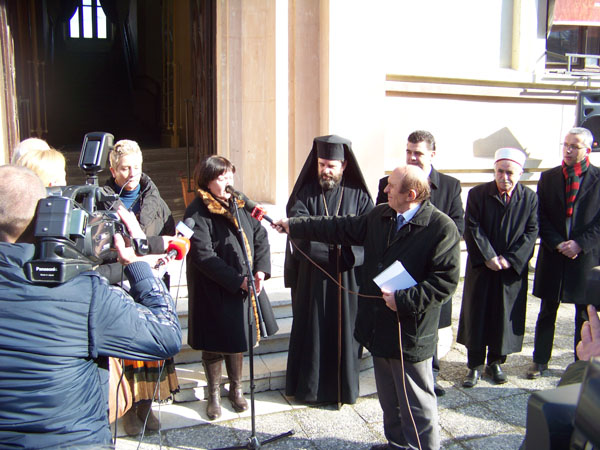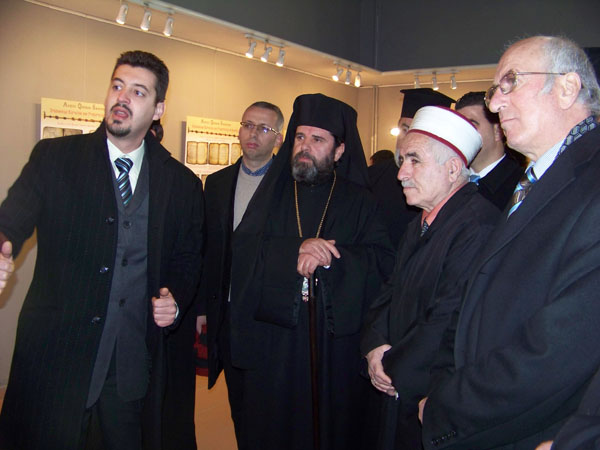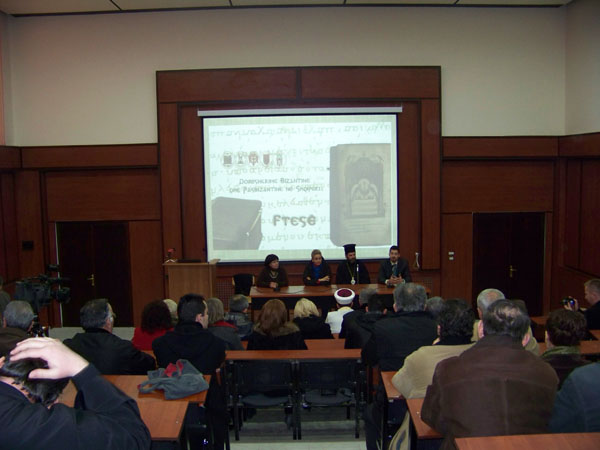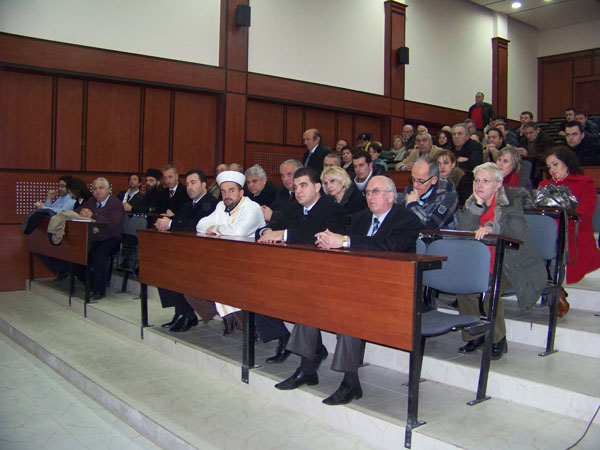The Tour of the Exhibition “Byzantine and Post-Byzantine Manuscripts in Albania” Begins; the First Stop is Korҫa
26/1/2011
The Albanian Orthodox Church
After the very successful opening in the capital of Tirana of the Exhibition “Byzantine and Post-Byzantine Manuscripts in Albania”, the Exhibition began touring the main cities of Albania with the goal of making known these treasures to the general public. The official opening of this Exhibition was held on January 7th, in Korҫa at the facilities of the “Vangjush Miho” Cultural Centre. The Exhibition was organized by the General Director of Archives, the Faculty of History and Philology Department of the University of Tirana, the Holy Metropolis of Korҫa, the Municipality of Korҫa and the District Prefecture of Korҫa. The scientific oversight of this activity was conducted by the historian/paleographer, Mr. Andi (Andrea) Rembeci and the archivist/paleographer, Mr. Sokol Cunga.
Attending the Exhibition were: Prof. Dr. Nevila Nika, General Director of Albanian Archives, the Venerable Dean of the Faculty of History and Philology of the University of Tirana, Prof. Dr. Valentina Duka, the Bishop of Korҫa, Metropolitan Joan Pelushi, the Prefect of the District of Korҫa, Mr. Andrea Mano, the Venerable President of the Municipality of Korҫa, Mr. Sotiraq Filo, representatives of the religious communities, local government officials, historians, well known intellectuals, and clerics etc..
First, the Director of the Central State Archives, Dr. Nevila Niko, welcomed the participants and described this Exhibition as a window for remembering our ancestors. According to her, “the perpetuity of the documentary materials that speak about Korҫa, as well as the codices of the Metropolis of Korҫa are a culturally rich heritage that endures from generation to generation. These books are living proof of the education and cultural level our ancestors once used in their daily life. Let us appreciate them and let us pass them on with respect to our successors, as we received them from our ancestors.
The participants were also greeted by the Venerable Dean of the Faculty of History and Philology of the University of Tirana, Dr. Valentina Duka, who stressed the importance that such an Exhibition holds for Korҫa. Among other things, she added, “This Exhibition reveals the extraordinary value that these testimonies communicate of the many centuries of the history of our people. From the first Byzantine emperors, to the powerful patriarchs that ruled within the Ottoman Empire, they open a window into the cultural past of the medieval regions of Albania and provide valuable evidence about the contribution and active role of Albania’s cultural development.”
Then the participants were welcomed by the Metropolitan of Korҫa, His Eminence Joan Pelushi, who among other things emphasized that, “An exhibition of the history of the past becomes a function of the present, but also of the future. Because only by being familiar with the past can we understand the present and build the future…The study of these manuscripts, as well as every aspect of history, must present reality as it is, with all the beauty, majesty and weakness that they may have…I have the impression that often, when talking about these manuscripts, the full details are not given… Very little is spoken about the authors, who are also anonymous, even less about the spirit that inspired them, as well as for the religio-cultural environment in which they lived. For various reasons the Orthodox Church, which was the creator of these manuscripts, is mentioned rarely or not at all, leaving it almost in the shadow…I am pleased because recently we see a more realistic and scientific approach to them.”
The next greeting was of the Prefect of Korҫa, Mr. Andrea Mano, who welcomed the participants emphasizing that, “For the general public, the Exhibition of Byzantine and Post-Byzantine Manuscripts create an awareness of and feeling of pride, as Albanians, for that past. The citizens of Korҫa, in particular, can rightfully feel proud of the contribution that has been given by their predecessors in the social, cultural and historical development of Albania.” After citing as an example the great historic importance that the Codices of Korҫa and Selasfori represent, he ended by saying, “As a Prefect of the District of Korҫa and as its citizen, I appreciate the opening of this Exhibition and I’m confident that Korҫa will continue to contribute to the field of culture in the generations that are to come.”
On behalf of the Venerable Mayor of Korҫa, Mr. Niko Peleshi, the Vice Mayor of Korҫa, Mr. Sotiraq Filo, gave the opening welcome for the Exhibition and expressed the importance of this activity dedicated to the values of faith and knowledge. He added, “As true encyclopedias of Christian thought, the Codices of Albania are monuments of culture and civilization in our region and maintain the seal of the place where Albanians and their ancestors lived…These ancient manuscripts offer a replica of the path through which Christianity walked in our country and show how faith and knowledge were transmitted from one generation to another. The role of the Orthodox Church in this process is incomparable.”
Afterwards, the participants visited the Exhibition, which will remain open until the 15th of January.
The Exhibit displayed 45 photographic panels of codices belonging to the historical period from the VI until XVIII century. Among them were displayed two well known Codices, Beratinus Purpureus 1 and Beratinus Purpureus 2, which are part of the World Heritage Register of UNESCO.
That afternoon, on the campus of the “Fan S. Noli” University of Korҫa a scientific meeting took place on the same topic. Present at this meeting were the Rector of the University of Korҫa, Mr. Gjergji Mero, professors from Albania, as well as foreign scholars, intellectuals, representatives of religious communities, local government, clergy and students. During this meeting various talks were given that shed light on a very valued part of the history and of the rich Christian cultural traditions in our country; specifically, the history and tradition of the Byzantine and Post-Byzantine Manuscripts and their multidimensional value as historical sources and the artistic sensibilities that they convey.
Events of this nature have as a goal the recognition of the research by the general public of a valuable part of the history and the rich cultural traditions of our country, which has been created, cultivated and kept over the centuries by Orthodox Christians and are now preserved in AQSH.
Translated by Ana Meni
Edited by Anastasia Pamela Barksdale, M.Div




